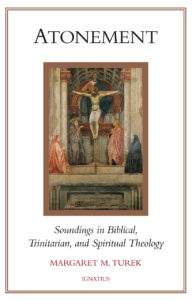Podcast: Play in new window | Download (Duration: 27:51 — 19.2MB) | Embed
Subscribe: Apple Podcasts | Spotify | Amazon Music | Android | Pandora | iHeartRadio | JioSaavn | Podchaser | Gaana | Podcast Index | Email | TuneIn | Deezer | Anghami | RSS | More

The Revelation of Love in God’s Wrath – Atonement: Soundings in Biblical, Trinitarian, and Spiritual Theology
Discerning Hearts presents a series of conversations between Dr. Margaret Turek and Evan Collins about her book, “Atonement: Soundings in Biblical, Trinitarian, and Spiritual Theology.”
 You can pick up a copy of the book here:
You can pick up a copy of the book here:
An excerpt from the book:
“According to the Old Testament, sin is not simply an ethical fault. It is not simply a failure to act according to the natural law inscribed in every conscience. There is more to it, for the proper setting in which to understand sin is the covenant relationship. Already in the old alliance, the fervent emphasis on keeping the commandments signifies nothing less than Israel’s response of grateful love expressed in actions. “Good deeds become acts of personal fidelity, faithfulness to the personal God”, explains Levenson, “and not simply the right things to do within some universal code of ethics (though they may be that as well).Conversely, bad deeds become acts of betrayal. . . . They are not simply morally wrong in the abstract: they wrong the divine covenant partner.”63 Consider, for instance, the Lord’s response to the sin of David, which the prophet Nathan communicates to the king in 2 Samuel 12:7–9. Thus says the LORD God of Israel: I anointed you king over Israel: I delivered you from the hand of Saul. I gave you your lord’s house and your lord’s wives for your own. I gave you the house of Israel and of Judah. And if this were not enough, I could count up for you still more. Why have you despised the LORD and done what is evil in his sight? You have cut down Uriah the Hittite with the sword; his wife you took as your own, and him you killed with the sword of the Ammonites.
God.64 Sin is fundamentally a refusal to see and mirror the character of God, whose deeds show his paternal presence and benevolence (Ex 4:22–23; Deut 4:37; 7:8). It is a refusal to hear and to live according to the words that God personally addresses to his chosen beloved (Zeph 3:2; Bar 1:15–22). As Balthasar points out, “The particular transgressions against the commandments . . . are only the results of a fundamental evil, namely, a falling away from the covenant relationship, betrayal, disobedience, culpable forgetfulness of God, the sinful failure to ‘know God’.”65 Sin as deed is thus unmasked as a refusal to exist in intimate co-existence with God. Sin indicates a spurning of the Lord’s love; it is a forsaking of God (Hos 1:2, 9; 4:10; Is 1:2, 4).66″
Turek, Margaret. Atonement: Soundings in Biblical, Trinitarian, and Spiritual Theology (pp. 39-40). Ignatius Press. Kindle Edition.
From the book’s description:
“This book presents the chief insights concerning the mystery of atonement in the works of four theological guides: John Paul II, Joseph Ratzinger/Benedict XVI, Hans Urs von Balthasar, and Norbert Hoffmann.
The author argues for the central importance and perennial value of a theology of atonement, even as she explains the modern aversion to it. The book’s central aim is to deepen our understanding of the biblical claim that God shows himself to be love precisely by sending his Son as atonement. “In this is love: not that we loved God, but that he loved us and sent his Son as expiation for our sins” (1 Jn 4:10).
The book develops a compelling vision of atonement as a process that originates from and is engendered by God’s own power to love. This vision not only takes account of the gravity of sin and its consequences but also provides a clear illumination of the wholly gratuitous, radically forgiving, passionate and powerful nature of God’s redeeming love for mankind. Distinct from the majority of theological accounts of atonement, which focus almost exclusively on the role of Christ, this book highlights the role of God the Father in the atoning mission of the Son.”

